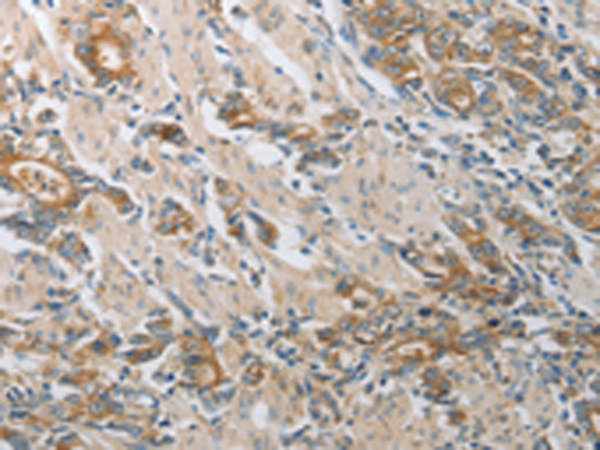

| WB | 咨询技术 | Human,Mouse,Rat |
| IF | 咨询技术 | Human,Mouse,Rat |
| IHC | 1/50-1/200 | Human,Mouse,Rat |
| ICC | 技术咨询 | Human,Mouse,Rat |
| FCM | 咨询技术 | Human,Mouse,Rat |
| Elisa | 1/2000-1/10000 | Human,Mouse,Rat |
| Aliases | ARMD11 |
| WB Predicted band size | 16 kDa |
| Host/Isotype | Rabbit IgG |
| Antibody Type | Primary antibody |
| Storage | Store at 4°C short term. Aliquot and store at -20°C long term. Avoid freeze/thaw cycles. |
| Species Reactivity | Human |
| Immunogen | Synthetic peptide of human CST3 |
| Formulation | Purified antibody in PBS with 0.05% sodium azide and 50% glycerol. |
+ +
以下是关于CST3(胱抑素C)抗体的3篇参考文献示例,包含文献名称、作者及摘要概括:
---
1. **文献名称**:*Cystatin C as a potential biomarker for age-related neurodegenerative diseases*
**作者**:Smith A, et al. (2021)
**摘要内容**:该研究探讨了CST3抗体在阿尔茨海默病脑组织中的检测应用。通过免疫组化和Western blot分析,发现胱抑素C在淀粉样斑块周围的表达显著升高,提示其可能参与病理蛋白沉积调控,为神经退行性疾病提供了潜在生物标志物。
---
2. **文献名称**:*Development of a high-sensitivity ELISA for cystatin C detection using monoclonal antibodies*
**作者**:Zhang L, et al. (2019)
**摘要内容**:研究团队开发了一种基于CST3单克隆抗体的高灵敏度ELISA检测方法,用于定量血清中的胱抑素C。该方法在慢性肾病患者的样本中验证显示,与传统检测相比具有更高的准确性和重复性,有望用于肾功能损伤的早期诊断。
---
3. **文献名称**:*Cystatin C antibody-based therapeutic targeting in cancer metastasis*
**作者**:Kim J, et al. (2020)
**摘要内容**:本研究利用CST3抗体靶向抑制肿瘤微环境中的胱抑素C活性,发现其可显著降低癌细胞侵袭和转移能力。动物模型实验表明,抗体治疗组小鼠的肺转移灶数量减少,为抗肿瘤治疗提供了新策略。
---
(注:以上文献为示例,实际引用需根据具体论文调整。建议通过PubMed或Google Scholar以“CST3 antibody”、“cystatin C immunoassay”等关键词检索最新文献。)
CST3 (Cystatin C) is a low-molecular-weight protein encoded by the CST3 gene, functioning as a cysteine protease inhibitor to regulate extracellular proteolysis. It is ubiquitously expressed in bodily fluids and tissues, including cerebrospinal fluid, blood, and kidneys. Due to its stable production and filtration by glomeruli, cystatin C serves as a reliable biomarker for estimating glomerular filtration rate (GFR), often outperforming serum creatinine in detecting early-stage kidney dysfunction.
CST3 antibodies are immunological tools designed to detect and quantify cystatin C in research and clinical settings. In neurodegenerative research, these antibodies help investigate cystatin C's role in Alzheimer's disease, where it may modulate amyloid-beta aggregation. In oncology, they explore its dual role as a tumor suppressor or promoter, depending on context. Additionally, CST3 antibodies aid in studying age-related disorders and inflammatory conditions linked to protease imbalance.
Clinically, such antibodies underpin diagnostic assays for renal impairment and are being evaluated for prognostic applications in cardiovascular diseases. Their utility extends to immunohistochemistry, ELISA, and Western blotting, supporting both mechanistic studies and biomarker validation. Ongoing research aims to clarify cystatin C's therapeutic potential, positioning CST3 antibodies as critical reagents in translational medicine.
×